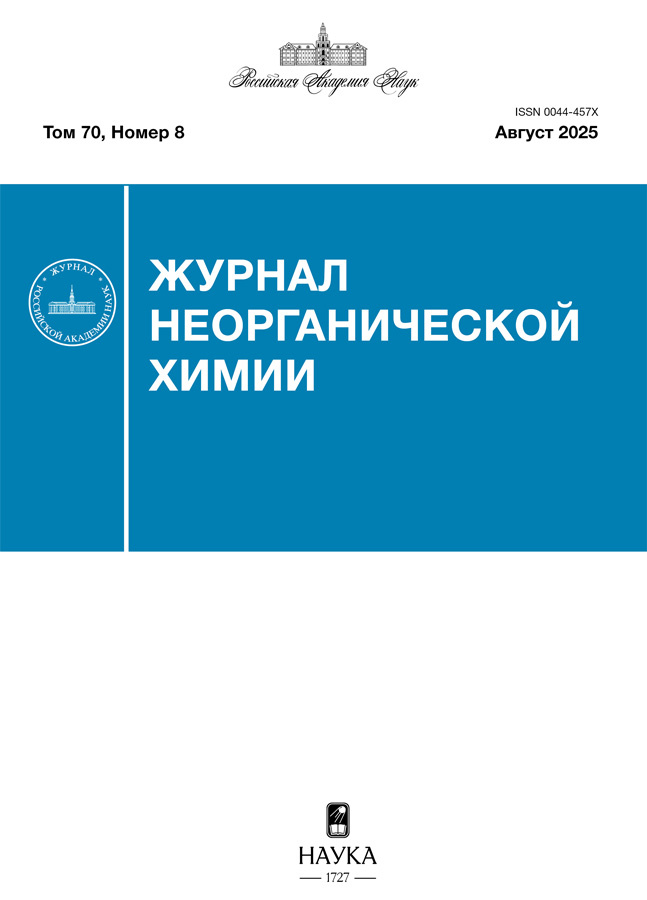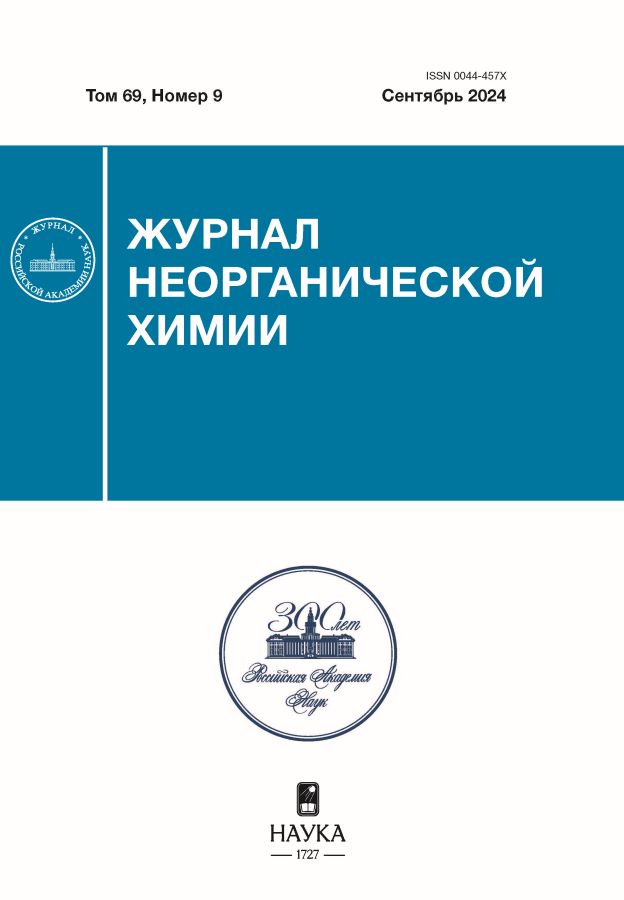Биостекло 45S5, легированое Bi2O3, для медицинского применения
- Авторы: Грищенко Д.Н.1, Медков М.А.1
-
Учреждения:
- Институт химии ДВО РАН
- Выпуск: Том 69, № 9 (2024)
- Страницы: 1267-1276
- Раздел: СИНТЕЗ И СВОЙСТВА НЕОРГАНИЧЕСКИХ СОЕДИНЕНИЙ
- URL: https://rjraap.com/0044-457X/article/view/676629
- DOI: https://doi.org/10.31857/S0044457X24090063
- EDN: https://elibrary.ru/JSWNTZ
- ID: 676629
Цитировать
Полный текст
Аннотация
Выполнено допирование биостекла Bioglass 45S5 оксидом висмута в концентрации до 40 мас. %. Аморфная природа синтезированных стекол подтверждена рентгенофазовым анализом. Исследовано влияние Bi2O3 на свойства биостекла. В ряду образцов, содержащих от 0 до 40 мас. % оксида висмута, их характеристики изменяются следующим образом: значения pH модельной среды при выщелачивании стекол снижаются от 7.84 до 7.46; рентгеноконтрастность увеличивается от 1150 HU до значений, превышающих 11000 HU; химическая деградация падает от 1.299 до 0.424%; биоактивность снижается в диапазоне 0–10 мас. % и отсутствует в диапазоне 20–40 мас. % Bi2O3. Стекла, содержащие до 10 мас. % Bi2O3, могут найти применение в восстановительной хирургии. Они обладают рентгеноконтрастными и биоактивными свойствами. Стекла, содержащие 20–40 мас. % Bi2O3, обладают высокой рентгеноконтрастностью, химической стойкостью, незначительным влиянием на pH среды при деградации. Они могут быть перспективны в качестве радиомодификаторов при лечении злокачественных новообразований методом лучевой терапии.
Ключевые слова
Полный текст
Об авторах
Д. Н. Грищенко
Институт химии ДВО РАН
Автор, ответственный за переписку.
Email: grishchenko@ich.dvo.ru
Россия, 690022, Владивосток, пр-т 100-летия Владивостока, 159
М. А. Медков
Институт химии ДВО РАН
Email: grishchenko@ich.dvo.ru
Россия, 690022, Владивосток, пр-т 100-летия Владивостока, 159
Список литературы
- Hench L.L. // J. Mater. Sci: Mater. Med. 2006. V. 17. P. 967. https://doi.org/10.1007/s10856-006-0432-z
- Miguez-Pacheco V., Hench L.L., Boccaccini A.R. // Acta Biomater. 2015. V. 13. P. 1. https://doi.org/10.1016/j.actbio.2014.11.004
- Mazzoni E., Iaquinta M.-R., Lanzillotti C. et al. // Front. Bioeng. Biotechnol. 2021. V. 9. P. 613787. https://doi.org/10.3389/fbioe.2021.613787
- Wang R., Li H., Sun H. // Encyclopedia of Environmental Health. 2019. P. 415. https://doi.org/10.1016/B978-0-12-409548-9.11870-6
- Shahbazi‐Gahrouei D., Choghazardi Y., Kazemzadeh A. et al. // IET Nanobiotechnol. 2023. V. 17. P. 302. https://doi.org/10.1049/nbt2.12134
- Thomas F., Bialek B., Hensel R. // J. Clin. Toxicol. 2011. V. 3. P. 4. https://doi.org/10.4172/2161-0495.S3-004
- Pazarçeviren A.E., Tahmasebifar A., Tezcaner A. et al. // Ceram. Int. 2018. V. 44. P. 3791. https://doi.org/10.1016/j.ceramint.2017.11.164
- Mohn D., Zehnder M., Imfeld T., Stark W.J. // Int. Endod. J. 2010. V. 43. P. 210. https://doi.org/10.1111/j.1365-2591.2009.01660.x
- Prasad S.S, Adarsh T., Anand A. et al. // J. Mater. Res. 2018. V. 33. P. 178. https://doi.org/10.1557/jmr.2017.442
- Wang L., Long N.J., Li L. et al. // Light Sci. Appl. 2018. V. 7. https://doi.org/10.1038/s41377-018-0007-z
- Du J., Ding H., Fu S. et al. // Front. Bioeng. Biotechnol. Sec. Nanobiotechnology. 2023. V. 10. P. 1098923. https://doi.org/10.3389/fbioe.2022.1098923
- Khatua C., Bodhak S., Kundu B., Balla V.K. // Materialia. 2018. V. 4. P. 361. https://doi.org/10.1016/j.mtla.2018.10.014
- Heid S., Stoessel P.R., Tauböck T.T. et al. // Biomed Glass. 2016. V. 2. P. 29. https://doi.org/10.1515/bglass-2016-0004/html
- Pazarçeviren A.E., Evis Z., Keskin D., Tezcaner A. // Biomed Mater. 2019. V. 14. P. 035018. https://doi.org/10.1088/1748-605X/ab007b
- Kokubo T., Takadama H. // Biomaterials. 2006. V. 27. P. 2907. https://doi.org/10.1016/j.biomaterials.2006.01.017
- Prasad S.S., Ratha I., Adarsh T. et al. // J. Mater. Res. 2018. V. 33. P. 178. https://doi.org/10.1557/jmr.2017.442
- Rabiee M., Nazparvar N., Azizian M. et al. // Ceram. Int. 2015. V. 41. P. 7241. https://doi.org/10.1016/j.ceramint.2015.02.140
- Misch C.E. // Int. J. Oral Implantol. 1990. V. 6. P. 23.
- Łaczka M., Stoch L., Górecki J. // J. Alloys Compd. 1992. V. 186. P. 279. https://doi.org/10.1016/0925-8388(92)90015-2
- Плотникова О.С., Грищенко Д.Н., Медков М.А. и др. // Журн. неорган. химии. 2022. Т. 67. № 9. С. 1219. https://doi.org/10.31857/S0044457X22090094
- Смагулова З.Ш., Макарушко С.Г., Садыкова Х.М. и др. // Здоровье. Медицинская экология. М.: Наука, 2009. Т. 39–40. С. 173.
- Silver I.A., Deas J., Erecińska M. // Biomaterials. 2001. V. 22. P. 175. https://doi.org/10.1016/S0142-9612(00)00173-3
- Cerruti M., Greenspan D., Powers K. // Biomaterials. 2005. V. 26. P. 1665. https://doi.org/10.1016/j.biomaterials.2004.07.009
Дополнительные файлы



















